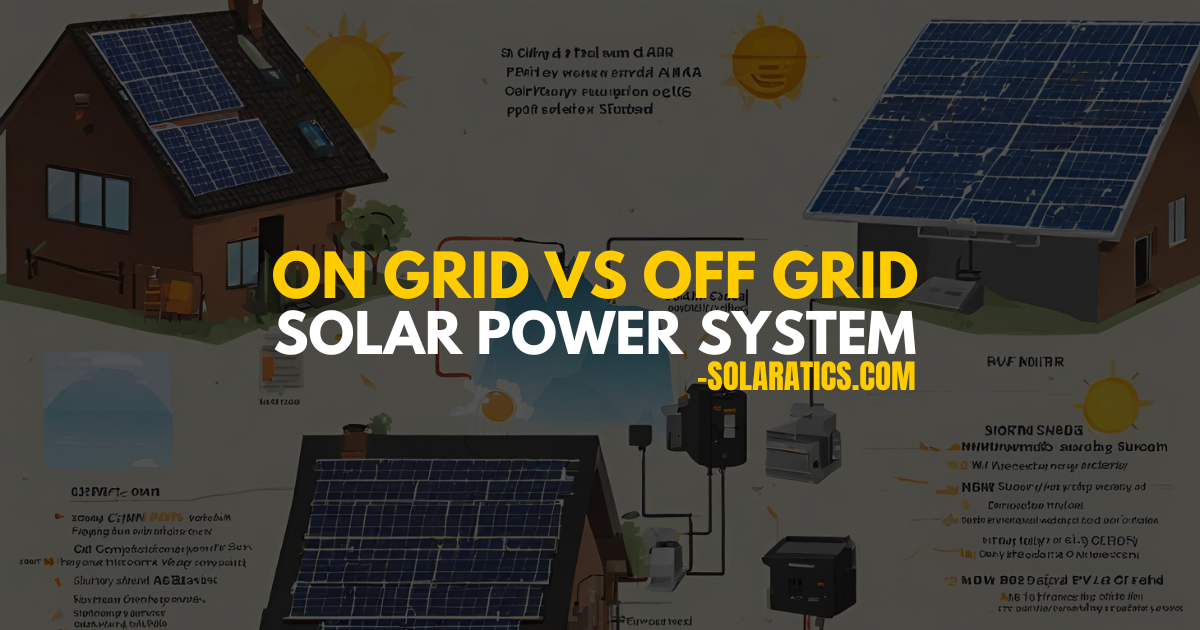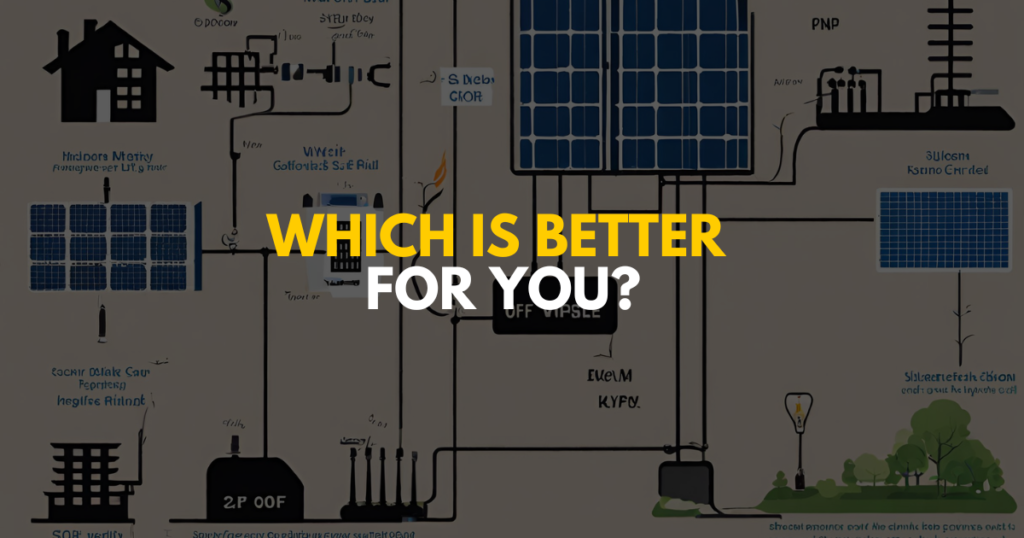On Grid vs Off Grid Solar Power System: Which One is Right for You?

Harnessing the sun’s power to light your home is fantastic, but when it comes to solar, you have two main choices: on-grid and off-grid systems. Choosing the right one can feel like navigating a solar eclipse, but fear not! This guide will shine a bright light on both options, On Grid vs Off grid solar power system which one is right for you?
On Grid Solar Power Systems:
Imagine solar panels like sun-hungry robots that gobble up sunlight and turn it into electricity. On-grid systems are like these robots working in a factory with a boss – the power grid. The electricity they generate flows to your home and any excess power gets sent back to the grid, earning you credits or even cash!
This means you can still draw power from the grid at night or on cloudy days. Think of it as a team effort between sunshine and the grid, keeping your lights on.
Off Grid Solar Power Systems:
Off-grid systems are like self-sufficient solar robots, living off the grid in their own little island. They rely on batteries to store the sun’s energy, so you’re completely independent from the grid. This sounds exciting, like living on a solar spaceship! But remember, just like astronauts, you need to carefully manage your energy resources. If you use more than you generate, your batteries might run out, leaving you in the dark.
Comparative Analysis: On-Grid vs. Off-Grid:
Cost: On-grid systems are generally cheaper upfront, while off-grid systems require expensive batteries, making them pricier.
Maintenance: On-grid systems are simpler to maintain, while off-grid systems need regular battery checks and system monitoring.
Reliability: On-grid systems offer backup from the grid, while off-grid systems rely solely on batteries, so power outages can be a concern.
Environmental Impact: Both systems reduce reliance on fossil fuels, but off-grid systems can be even greener as they minimize grid dependency.
Which is Better for You?

It depends on your lifestyle and location! On-grid systems are perfect for urban and suburban areas with reliable grids, those who want lower upfront costs, and those who don’t mind using the grid as a backup. Off-grid systems are ideal for remote areas, eco-conscious individuals who want complete energy independence, and those who enjoy living sustainably.
Maintenance and Durability:
Both systems require minimal maintenance, but off-grid systems need more attention due to batteries. However, both have long lifespans, with solar panels lasting 25-30 years and batteries around 5-10 years.
Technological Advancements in 2024:
Solar technology is constantly evolving! New and efficient solar panels are emerging, and battery storage technology is improving, making off-grid systems more viable.
Case Studies: Real-World Examples:
Imagine families living off-grid in Hawaii powered by their own solar systems, or small businesses in rural areas thriving with reliable on-grid solar. These are just a few examples of how solar is changing lives!
Regulatory Landscape:
Government policies and incentives vary, so research solar regulations and rebates in your area to maximize your solar gains.
Community and Social Impact:
Solar power contributes to cleaner air, reduced reliance on fossil fuels, and energy independence for communities.
Future Trends in Solar Power Systems:
Expect smarter systems with AI-powered energy management, hybrid grid-tied and off-grid options, and even solar roofs integrated into buildings!
Conclusion:
Whether you team up with the grid or go solo with off-grid, remember, that solar power is the bright future. Choose the system that fits your needs, harness the sun’s power, and join the solar revolution!
Also Explore: Adding Solar Panels to Existing System (2024 Guide)
FAQs About On grid vs Off grid solar power system
On-grid systems are typically cheaper because they don’t need batteries, while off-grid systems require them for nighttime and cloudy days.
Off-grid solar is your best bet for energy independence! Just remember to invest in a good battery bank to store your sunshine savings.
While DIY kits exist, it’s highly recommended to hire professionals for safety, optimal performance, and warranty coverage. Think of it as calling in a superhero electrician!
Yes, but like a shy sunflower, it generates less electricity than on sunny days. So, size your system to account for those cloudy days too!
